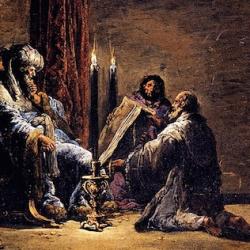At the end of 1 Chronicles, David delivers a series of speeches to the qahal (assembly) of Israel, the officers and princes of his court and bureaucracy (on 1 Chronicles 28–29 generally, see here). The qahal consists of the “princes” (sar is used 6x) and warriors (gibborim).
The speech is structured chiastically:
A. Hear (shema), v. 2a
B. In my heart to build, v. 2b
C. God said, You shall not build, v. 3
D. Yahweh chose David and Solomon, vv. 4–5
C’. Solomon will build, v. 6
B’. Solomon’s kingdom established, v. 7
A’. Guard and seek God’s commandments, v. 8
The Torah-frame is notable: David begins with a Deuternomy 6-ish “Hear, brethren and people” and ends with an exhortation to keep the Lord’s commandments in order to retain the land. That sets the context for David’s talk about temple-building. A successful temple project doesn’t depend on mere skill (“wise” men, men of chochmah, v. 21). It will succeed if the leaders of Israel “listen” and “guard and seek” God’s commandments.
In 1 Chronicles 17, Yahweh prohibits David from building a house for Yahweh because Yahweh is building a house for David. In chapter 28 (as in 1 Chronicles 22), the issue is David’s life of war and bloodshed. Though his wars were legitimate and just, they disqualify him from building a “house of rest” (v. 2). The sharp distinction between wartime and peacetime kingship is remarkable, especially as David’s exhortations to Solomon have a military ring to them (“be courageous and act,” 28:9; “be strong and courageous, and act,” 28:20). There is a time for war and a time for peace; there is also a king for war and a king for peace, a king who breaks and a king who builds. Peacetime politics is not war carried on by other means.
Though the practical issue of the speech has to do with building the temple, David’s speech is centrally about election—Yahweh’s choice of David and Solomon. The election is multilayered, both communal and individual. In the background is the Deuteronomic truth that Yahweh chose Israel; in choosing a king, Yahweh is choosing an Israel-in-flesh. David explicitly names four levels of election: God chose Judah from among the tribes; Jesse’s house within Judah; David from among his brothers; Solomon from among David’s sons (vv. 4–6; bachar 4x). God chooses a nation, a tribe, a family, and within that family, individuals.
David varies the language at the end of verse 4. The electing God “took pleasure” (ratzah) in David from among the sons of Jesse. Among other things, it’s a sacrificial term for the “acceptance” of an offering that meets the requirements of wholeness (Leviticus 1:4; 7:18; 22:23, 25). That sacrificial motif plays underneath David’s speech. Saul was chosen by lots, in a similar multilayered, telescoping process: Benjamin is taken, Kish’s house is taken, Saul is taken (1 Samuel 10:20–21). And we can hardly read about Saul’s selection without thinking of Achan, who is revealed as the cause of Israel’s defeat at Ai by a similar process of lot-casting (Joshua 7:16–18). Saul is designated as king, and Achan unveiled as a criminal, by the same process that determines the scapegoat on the Day of Atonement. Both Saul and Achan are “sacrificial,” though different ways. (Saul’s death is a scapegoat death that clears the land and makes way for renewal.) David too is a choice sacrifice.
Saul is selected by lot, but there is no mention of an extension of Yahweh’s choice beyond Saul. Yahweh’s choice of David, though, doesn’t terminate with David. David is chosen from his father’s sons, and then Solomon is further chosen from among David’s sons. At the very least, this means that David’s line has a future that Saul’s did not. Yahweh’s choice of David is an inter-generational election. David is chosen as father of a chosen son.
Yahweh’s choice of both David and Solomon is an election to privilege. David is chosen “to be king over Israel” (v. 4). Solomon appears to have an even higher status, chosen to “sit on the throne of the kingdom of Yahweh over Israel” (v. 5). As man of peace and royal builder, Solomon is a “sacrament” (William Johnstone) of Yahweh’s kingship in a more overt way even than David. He shares Yahweh’s throne because He is chosen as Yahweh’s son (v. 6). Sonship is everywhere in the passage (ben is used 17x in chapters 28–29; 7x in David’s opening speech alone). David repeatedly refers to Jesse’s sons and his own: “among the sons of my father . . . of all my sons . . . many sons . . . chosen my son Solomon . . . Your son Solomon” (vv. 4–6a). Then BOOM: In the sixth use of “son” in the speech, Yahweh breaks in to claim David’s son as his own: “Your son Solomon . . . I have chosen to be a son to Me.”
A chosen son is a privileged son who sits on Daddy’s throne. A chosen son is also a son with a task. Yahweh ben is the one who will banah a house for his Father. That is what sons do; indeed, that’s what sons are. A man is a father only if he has children, so his sons and daughters are the house-builders for the father. Sons can, of course, make a muck of it. A foolish son destroys his father’s house, legacy, wealth, and reputation. But a wise son builds and is a house for his father. Now, go thou and allegorize.
Barthians have already anticipated the denouement. Yahweh elects David and Solomon, and so determines their status, task, and future. Yahweh’s election of David, and especially of Solomon, is also a self-determination. Once He has chosen David—freely, out of His delight in David—He is determined as God of David. More intimately, He determines Himself as Father by His choice of Solomon as His son. Yahweh’s election is determinative for Israel and the nations. Yahweh’s election is likewise determinative for Yahweh. Once He elects, He cannot abandon Israel or David without denying Himself, something He cannot do.















